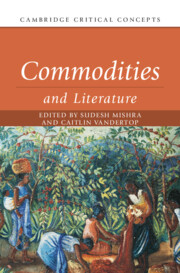Book contents
- Commodities and Literature
- Cambridge Critical Concepts
- Commodities and Literature
- Copyright page
- Contents
- Contributors
- Acknowledgements
- Reading Commodities
- Part I Origins
- Part II Developments
- Part III Applications
- Chapter 9 Sugar
- Chapter 10 The (In)significance of Rum
- Chapter 11 Opium’s Imperial Intimacies
- Chapter 12 Guano and the Fictions of Fertile Islands
- Chapter 13 Water in World Literature
- Chapter 14 From Napoleon to MacArthur
- Chapter 15 Oil, Commodity Frontiers, and the Materials of the Road Novel
- Chapter 16 Lithium in the Web of Life
- Bibliography
- Index
Chapter 9 - Sugar
Literature’s Bitter, Bitter Commodity
from Part III - Applications
Published online by Cambridge University Press: 14 October 2025
- Commodities and Literature
- Cambridge Critical Concepts
- Commodities and Literature
- Copyright page
- Contents
- Contributors
- Acknowledgements
- Reading Commodities
- Part I Origins
- Part II Developments
- Part III Applications
- Chapter 9 Sugar
- Chapter 10 The (In)significance of Rum
- Chapter 11 Opium’s Imperial Intimacies
- Chapter 12 Guano and the Fictions of Fertile Islands
- Chapter 13 Water in World Literature
- Chapter 14 From Napoleon to MacArthur
- Chapter 15 Oil, Commodity Frontiers, and the Materials of the Road Novel
- Chapter 16 Lithium in the Web of Life
- Bibliography
- Index
Summary
Sugar as an industrial commodity has featured in colonial as well as postcolonial literary texts. On the one hand, it stimulates desire and, on the other, it induces terror and abjection. Its status as an object of desire hinges on colonial modes of surplus accumulation as celebrated by its literary apologists. It serves as the muse of plantation capital precisely because its global demand generates revenue for those invested in the expropriating instruments of Empire. The imagination of the postcolonial writer, in contrast, represents sugar as an exceptionally bitter commodity. For it speaks to a harrowing history of abduction, deceit, transportation, drudgery, degradation, murder, insanity, rape and penury. It denatures nature, ecologically, and dehumanizes humans, physically as well as psychically. It gives birth to a grotesque and unnerving disorder. This chapters discusses literary texts from Oceania and the Caribbean that revolve around sugar—a commodity implicated in slavery and indentured servitude.
Keywords
Information
- Type
- Chapter
- Information
- Commodities and Literature , pp. 163 - 178Publisher: Cambridge University PressPrint publication year: 2025
Accessibility standard: WCAG 2.1 AA
Why this information is here
This section outlines the accessibility features of this content - including support for screen readers, full keyboard navigation and high-contrast display options. This may not be relevant for you.Accessibility Information
Content Navigation
Allows you to navigate directly to chapters, sections, or non‐text items through a linked table of contents, reducing the need for extensive scrolling.
Provides an interactive index, letting you go straight to where a term or subject appears in the text without manual searching.
Reading Order & Textual Equivalents
You will encounter all content (including footnotes, captions, etc.) in a clear, sequential flow, making it easier to follow with assistive tools like screen readers.
You get concise descriptions (for images, charts, or media clips), ensuring you do not miss crucial information when visual or audio elements are not accessible.
Visual Accessibility
You will still understand key ideas or prompts without relying solely on colour, which is especially helpful if you have colour vision deficiencies.
Structural and Technical Features
You gain clarity from ARIA (Accessible Rich Internet Applications) roles and attributes, as they help assistive technologies interpret how each part of the content functions.
